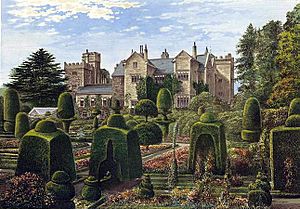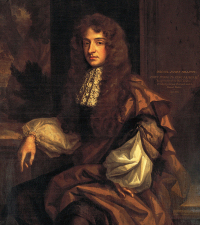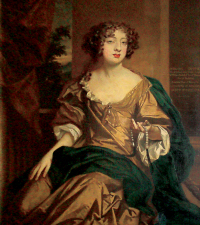James Grahme facts for kids
James Grahme (1649–1730) was an important English man. He was an army officer and worked closely with the king. He also served as a politician in the English and British Parliament from 1685 to 1727. After the Glorious Revolution, he supported King James II and was involved in plans to bring him back to power.
Contents
Early Life and Education
James Grahme was born in March 1649 at Norton Conyers in Yorkshire. His father was Sir George Graham, and his mother was Lady Mary Johnston.
He went to Westminster School, which was a famous school. Later, at age 16, he studied at Christ Church, Oxford university in 1666.
Military Career
Grahme started his army career in 1671. He received a special order from King Louis XIV of France to be a captain in a Scottish army group.
In 1673, King Charles II of England also made him a captain. He served in different English army groups. By 1678, Grahme became a lieutenant-colonel, which is a high rank in the army. He also commanded his own company of soldiers.
Life at Court
James Grahme was well-liked at the royal court because of his good looks and manners. He fell in love with Dorothy Howard, who was a maid of honor to the queen. They got married in London in 1675.
By 1679, Grahme became the "keeper of the privy purse" for the Duchess of York. This meant he managed her personal money. Soon after, he did the same job for James, Duke of York, who later became King James II. Grahme even had rooms in St. James's Palace.
When James II became king in 1685, Grahme was given more important jobs. He continued as keeper of the privy purse. He also became the "Master of the Buckhounds," which meant he was in charge of the royal hunting dogs.
In 1685, Grahme was elected as a Member of Parliament for Carlisle. Around 1687, he bought a large estate called Levens Hall near Kendal.
Loyalty to King James II
Grahme was very trusted by King James II. When the Glorious Revolution happened in 1688, King James II had to leave England. Grahme went with him and even lent him money.
Grahme also made sure the king's valuable items, like royal plate and shares in companies, were safe. Because he supported King James II, he faced some financial problems.
Even though he visited King James II in France, Grahme also tried to get along with the new King William III. However, William III did not fully trust him.
In 1691, Grahme's brother was arrested for plotting against the new king. A search was made for Grahme too, and he was ordered to be arrested. He was later pardoned by King William III in 1692.
Despite the pardon, Grahme continued to visit King James II. He also started to encourage support for James II in Scotland. He was almost arrested again in London in 1692 while moving money to send to James. He later surrendered but was allowed to be released on bail.

In 1696, Grahme was arrested again because of a plot to harm King William III. He was sent to prison but was soon released. After this, he decided to live more quietly at his home, Levens Hall. He still kept in touch with his Jacobite friends. The famous garden at Levens Hall was designed by Monsieur Beaumont, who also worked for King James II.
Later Life and Retirement
Grahme's first wife, Dorothy, passed away in 1700. He married his second wife, Elizabeth Bromley, in 1702.
In 1701, Grahme officially accepted the new government. He was elected as a Member of Parliament for Appleby in 1702 and again in 1705. After his eldest son died, Grahme became the MP for Westmorland in 1708.
He was re-elected several times, serving in Parliament until 1727, when he retired from public life. In 1717, he was elected mayor of Appleby. He also served as a deputy-lieutenant for Westmorland in 1722.
James Grahme had a house in London and often stayed at his son-in-law's home in Wiltshire. He died there on January 26, 1730, and was buried on February 2. His tombstone says he was "faithful" to both King Charles II and King James II.
Family Life
With his first wife, Dorothy Howard, James Grahme had three sons and two daughters.
- His son, Henry Graham, also became a Member of Parliament.
- His son William became a captain in the navy.
- His son Richard died young in 1697 while studying at University College, Oxford.
- His eldest daughter, Catherine, married her cousin, Henry Bowes Howard. She inherited the Levens estate.
- His youngest daughter, Mary, lived with her father until her death around 1718.
Grahme did not have any children with his second wife.
 | James Van Der Zee |
 | Alma Thomas |
 | Ellis Wilson |
 | Margaret Taylor-Burroughs |



